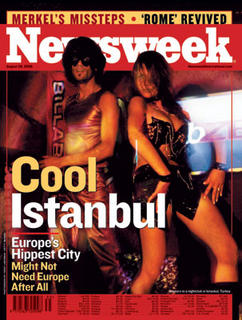The World's Top Intellectuals according to Prospect(UK) magazine's poll.
I voted for Vaclav Havel,Gary Becker,Orhan Pamuk, Steven Pinker and Milton Friedman, last month when the survey was being conducted.The list below is not surprising considering the influence of the thinkers such as Eco,Chomsky and Dawkins..I just dont understand how Christopher Hitchens got in there if this was not a popularity contest.Who is going to talk about Hitchens and his "intellectual contributions?" in a few decades from now?
Here are the top 5 with their bioghraphies...
NOAM CHOMSKY
Born in 1928 in Philadelphia, Chomsky earned his academic stripes as a young linguistics professor at MIT in the 1950s. His theory of transformational grammar, forged at this time, posits that the capability to form structured language is innate to the human mind. But the general public first came to know Chomsky for his outspoken opposition to the Vietnam war. For more than 40 years, he has been the academy’s loudest and most consistent critic of US policies at home and abroad. Chomsky has written more than 40 books and continues to lecture frequently, as prolific a provocateur as ever.
UMBERTO ECO
Umberto Eco might be known as a medievalist, but it is probably more apt to call him a renaissance man. Although the 73-year-old Italian is employed as a professor of semiotics at the University of Bologna, his body of work defies a single label. He has written about the philosophy of Aquinas, the relevance of aesthetics throughout time and the cultural influence of comic strips. And that’s just the non-fiction. Eco became known around the world for his novels The Name of the Rose and Foucault’s Pendulum, and the former was turned into a major Hollywood film starring Sean Connery.
RICHARD DAWKINS
Richard Dawkins burst on to the scene with his 1976 book The Selfish Gene, which presented the gene as the central unit of natural selection. Now professor of the public understanding of science at Oxford, Dawkins, 64, is a formidable critic of organised religion—as witnessed by his piece on “Gerin oil” for last month’s Prospect—and is now perhaps the world’s most vocal atheist. In books, essays and media appearances, Dawkins makes the case for science to the general public in a way few can match. He is now reportedly working on a documentary about religion, tentatively titled The Root of All Evil.
VÁCLAV HAVEL
Born in 1936 in Prague, Havel came to prominence in the 1970s for writing plays that ridiculed the absurdities of life in a dictatorship. His involvement with the Charter 77 initiative led to imprisonment and the banning of his work. In 1989, with the Berlin wall crumbling, Havel emerged as the leader of the “velvet revolution” and a year later was elected Czechoslovakian president.
Then, after the country split in 1992, he served as the president of the Czech Republic from 1993-2003. He remains active in Europe, chastising the EU for its passive approach to human rights in
countries like Burma and Cuba.
CHRISTOPHER HITCHENS
As a young Trotskyist, Christopher Hitchens made his name in the 1970s as a political writer on the New Statesman. After realising that he didn’t care whether Tony Benn or Denis Healey became deputy leader of the Labour party, he moved to the US in 1980, writing first for the Nation and later for Vanity Fair and the Atlantic. A series of attacks on Mother Teresa, Bill Clinton and Henry Kissinger earned him notoriety, but Hitchens, 56, is now best known for his messy split with the antiwar left over Bosnia and later Afghanistan and Iraq, and for his loud support for Bush’s war on terror.
MILTON FRIEDMAN
The New Jersey-raised son of Hungarian immigrants is most famous for championing individual freedom and for arguing that taxes should be cut “whenever it’s possible.” His theory of?monetarism, which emphasises the importance of control of the money supply, replaced Keynesianism for a time as the dominant strand in economic theory. Friedman’s work at the University of Chicago propelled his ideas into the political mainstream, and in 1976 he was awarded the Nobel prize in economics. His views, transmitted via Keith Joseph and the IEA, influenced the policies of the early Thatcher governments.













